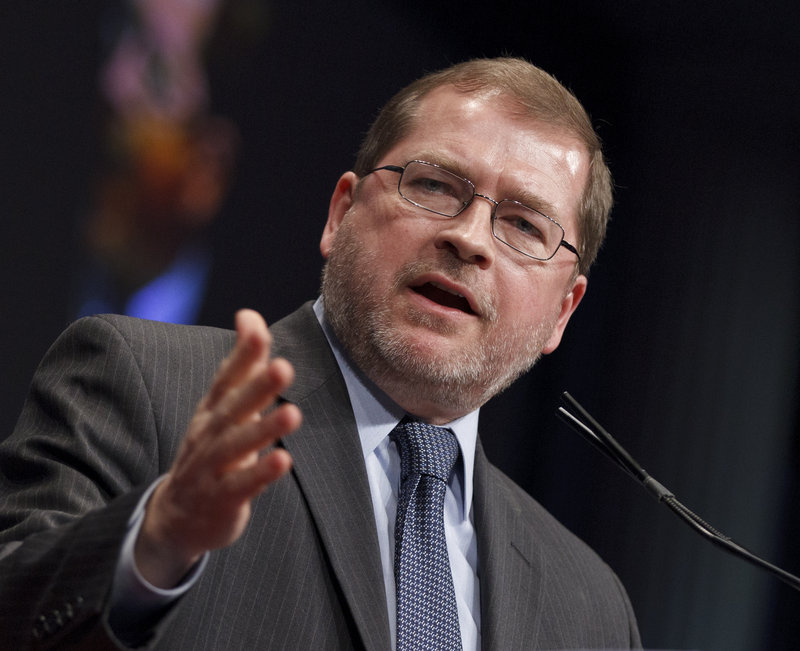WASHINGTON – In GOP activist circles it is known simply as the pledge, and over the past 25 years it has become the essential conservative credential for a whole generation of Republicans seeking elective office in a party defined by its implacable opposition to raising taxes.
Of the 242 Republicans serving in the House of Representatives, all but six have signed the anti-tax pledge that has emerged as a key enforcement mechanism of the Republican orthodoxy on taxes.
But now, an increasing number of Republicans running for Congress are declining to sign the pledge. It is a small sign that could signal a big shift in the GOP’s politics on taxes amid spiraling national deficits.
Of the 25 candidates this year promoted by the National Republican Congressional Committee as “Young Guns” and “Contenders” — the top rungs of a program highlighting promising candidates challenging Democrats or running in open seats — at least a third have indicated they do not plan to sign the Norquist pledge.
Two of the seven candidates promoted by the NRCC as the “Young Gun Vanguard” — candidates competing in open seats that are considered Republican-leaning — have also declined to sign.
Authored by anti-tax crusader Grover Norquist, the pledge compels candidates to resist any effort to raise tax rates for individuals and businesses. They also pledge to oppose the elimination of tax credits and deductions unless they are matched dollar-for-dollar with other tax cuts.
Norquist insists Americans for Tax Reform, the powerful group he founded in 1986, is ahead of schedule in collecting pledge signatures from congressional candidates for the year.
But among Republican challengers, there are defections.
Republican candidates declining to sign generally indicate that they nevertheless oppose tax hikes. But some are chaffing against the constraint on eliminating tax loopholes, believing those restrictions limit Republicans’ ability to negotiate seriously with Democrats on a deal to tackle the nation’s mounting debt.
In Pennsylvania, Republican state Rep. Scott Perry said he was disappointed to see his party’s presidential candidates — all but one of whom signed the pledge — uniformly indicate in a debate last year they would reject a deficit reduction deal that paired $1 in revenue increases for every $10 in spending cuts.
“I just think it’s imprudent to hem yourself in where you can’t make a good agreement that overall supports the things you want to do,” said Perry, who said he generally opposes tax increases but recently won a Republican primary in a conservative district over candidates who had signed the pledge. “I just don’t see what the point of signing would be for me. … I’ve got a record, and everyone who wants to know where I’ve been and where I’m at can look to that.”
Others insist they can make promises to voters without signing a pledge circulated by a Washington lobbying group, a sign that Democrats might be having some success at painting Norquist as a D.C. insider instead of the anti-establishment rebel he portrays himself as.
“I don’t want to get tied up in knots,” said Richard Tisei, an NRCC “Young Gun” and former Republican state senator in Massachusetts running against Democratic Rep. John Tierney (Mass.). “If there’s a loophole that can be closed that ends up generating additional revenue that can be used specifically to pay down the national debt, I’m not going to lose sleep. And I don’t want to be bound by the pledge not to close it.”
But the defections among some new candidates come as a small handful of incumbent Republicans who signed the pledge when they first ran for office — some years ago — are also publicly rejecting it.
Rep. Scott Rigell, a Republican freshman from Virginia who signed the pledge in 2010, recently posted an open letter to constituents indicating he would not renew the promise as he runs for re-election, fearing it could stand in the way of an everything-on-the-table approach to tackling mounting debt.
An erosion of support among candidates would be especially significant because Norquist has long aimed to collect signatures from Republicans before they take office — encouraging candidates to use their pledges to help to define their tax stance for voters.
Once a candidate signs, Norquist considers the pledge binding for the remainder of that person’s career in public service.
Send questions/comments to the editors.



Success. Please wait for the page to reload. If the page does not reload within 5 seconds, please refresh the page.
Enter your email and password to access comments.
Hi, to comment on stories you must . This profile is in addition to your subscription and website login.
Already have a commenting profile? .
Invalid username/password.
Please check your email to confirm and complete your registration.
Only subscribers are eligible to post comments. Please subscribe or login first for digital access. Here’s why.
Use the form below to reset your password. When you've submitted your account email, we will send an email with a reset code.